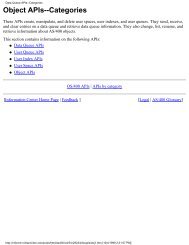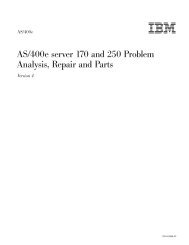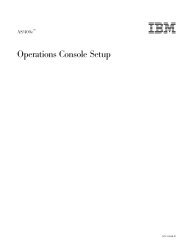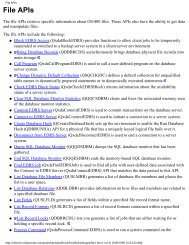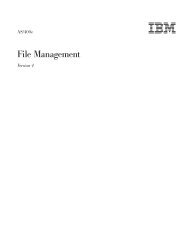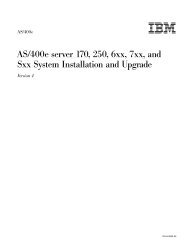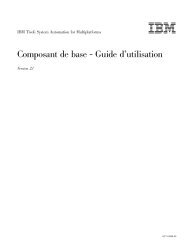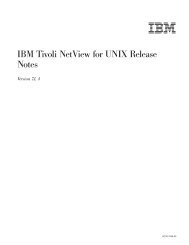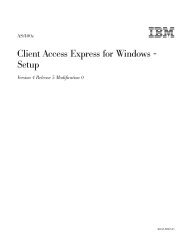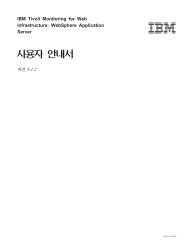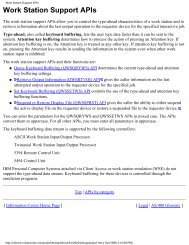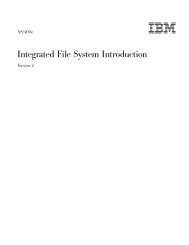Qshell Interpreter (qsh) - FTP Directory Listing - IBM
Qshell Interpreter (qsh) - FTP Directory Listing - IBM
Qshell Interpreter (qsh) - FTP Directory Listing - IBM
You also want an ePaper? Increase the reach of your titles
YUMPU automatically turns print PDFs into web optimized ePapers that Google loves.
Chapter 6. Remote client examples<br />
Server program<br />
The following two example programs show how to use a remote client that connects<br />
to an interactive <strong>qsh</strong> session on a AS/400.<br />
v Server program<br />
v Client program<br />
The server program is compiled and run on a AS/400.<br />
v See Creating and running the server program for more information.<br />
The client program is compiled and run on a remote system.<br />
v See Creating and running the client program for more information.<br />
[ Legal | AS/400 Glossary ]<br />
Disclaimer<br />
<strong>IBM</strong> grants you a nonexclusive license to use this as an example from which you can<br />
generate similar function tailored to your own specific needs.<br />
This sample code is provided by <strong>IBM</strong> for illustrative purposes only. These examples have not<br />
been thoroughly tested under all conditions. <strong>IBM</strong>, therefore, cannot guarantee or imply<br />
reliability, serviceability, or function of these programs.<br />
All programs contained herein are provided to you “AS IS” without any warranties of any<br />
kind. The implied warranties of merchantability and fitness for a particular purpose are<br />
expressly disclaimed.<br />
/**********************************************************************/<br />
/* */<br />
/* Name: server.c */<br />
/* */<br />
/* Description: This program is a server for starting interactive */<br />
/* <strong>qsh</strong> sessions on remote clients. The program */<br />
/* listens for connections from clients. When a */<br />
/* connection is accepted, it reads the user name */<br />
/* and password of the client. It then swaps to the */<br />
/* the specified user profile and spawns a new */<br />
/* process running the <strong>qsh</strong> shell interpreter that */<br />
/* handles the connection. */<br />
/* */<br />
/* Parameters: 1. Port number to listen for connections on. */<br />
/* */<br />
/* Notes: 1. The user name and password are sent as plain text */<br />
/* from the client. */<br />
/* 2. The user profile running this program must have */<br />
/* authority to the QSYGETPH, QSYRLSPH, and */<br />
/* QWTSETP APIs. */<br />
/* 3. You will need to change the value of the NLSPATH */<br />
/* environment variable if your system is using a */<br />
/* different language than 2924. */<br />
/* */<br />
/**********************************************************************/<br />
/**********************************************************************/<br />
/* Includes */<br />
/**********************************************************************/<br />
#include /* fopen(), vfprintf() */<br />
#include /* socket(), bind(), etc. */<br />
#include /* sockaddr_in, INADDR_ANY, etc. */<br />
#include /* inet_ntoa() */<br />
© Copyright <strong>IBM</strong> Corp. 1998, 1999 119



